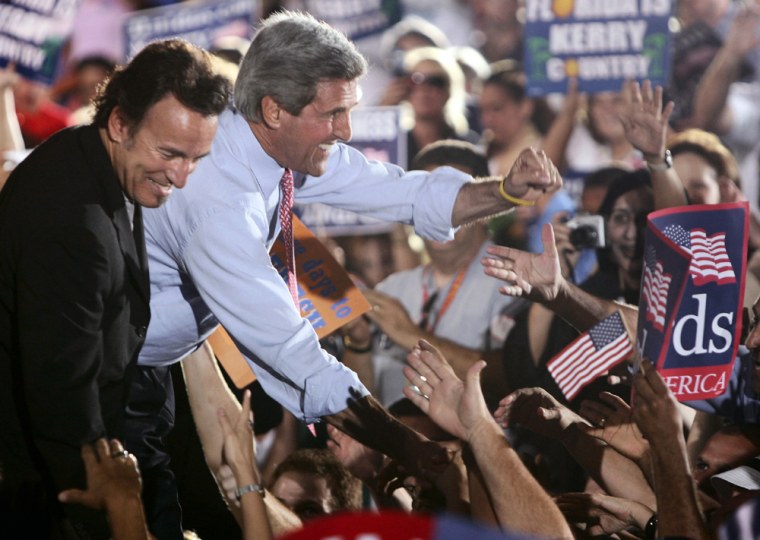It was a drumbeat you heard for months in the run-up to the election: This was the campaign in which young voters would make a difference — maybe the difference — for a candidate who reflected their passions and views.
For both parties, but mostly for the Democrats, high-magnitude stars tried to galvanize a demographic historically reluctant to vote.
A galaxy of celebrities — from Bruce Springsteen to P. Diddy, Leonardo diCaprio to Ashton Kutcher, Whoopi Goldberg to Martin Sheen, Jon Bon Jovi to Michael Moore — tried to communicate the idea that it was ultracool for young Americans to be politically engaged.
In the end, turnout among younger Americans did rise markedly, contributing to the biggest overall election turnout since 1968 — and sending a signal that, just maybe, political complacency for those voters is a thing of the past.
From downbeat to upbeat
Early on election day, exit polling data suggested that young voters were not turning out in the numbers activists had expected.
But once the votes were tallied, the research group CIRCLE found that almost 21 million Americans under 30 had voted — 4.6 million more than in 2000.
The turnout among young voters rose from about 42 percent to 51 percent, according to CIRCLE, which is based at the University of Maryland.
“There are more young voters registered now than in 2000,” said John Orman, a professor of politics at Fairfield University in Connecticut. “More young people voted in 2004 than in 2000 due to the increase in population.”
Young voters were the only age group to have favored Kerry. The Associated Press' exit polls found that under-30s favored Kerry over Bush, 55 percent to 44 percent, compared to a 48-46 edge for Al Gore in 2000.
A matter of loyalty
“If you’re a young Republican kid, whatever Michael Stipe or Bruce Springsteen or Michael Moore tells you won't have an impact," said Orman, co-author of “Celebrity Politics.” "We find that, roughly, young kids are Democrats and Republicans — much like their parents.”
What's more, Orman noted, some people are immune to the allure of celebrity, regardless of a star's affiliation. “If you're undecided or unaffiliated, sometimes [celebrity] breaks against you,” he said, referring to reports of a “backlash in the red states against celebrities.”
Not that Republicans haven't been brushed by fame. “The Republicans forget they have a number of celebrities of their own,” Orman said, noting that California Gov. Arnold Schwarzenegger "is a huge celebrity" and a featured speaker at the Republican National Convention. Others who came out for President Bush included actor Ron Silver, comedian and talk-show host Dennis Miller and singers Britney Spears and Jessica Simpson.
Pop culture ‘infused’ with politics
Jehmu Greene, the president of Rock the Vote, a nonprofit that wed rock culture to voter registration efforts a decade ago, said young voters helped make Tuesday's election a closer contest than it might have been.
“If you look at the numbers we’ve seen from Pennsylvania and Wisconsin and Ohio, where they were 20, 21 percent of the electorate and definitely broke for [Democratic Sen. John] Kerry, they kept this election close and turned out in higher numbers than we've seen in more than 10 years," Greene told MSNBC TV's Lester Holt.
“Popular culture was infused with a political message this time around, and it was because of celebrities reaching out to young people,” Greene said.
Jenny Toomey, the director of Air Traffic Control, an organization documenting music and political events, said “the punditocracy — particularly the conservative right" had been effective in "isolating and silencing" artists.
But she said that was partly countered by maverick outfits like the Air America radio network. “It's become an incredible organ for progressive ideas," she said.
Death Cab weighs in
Other groups and Web sites that helped pave the intersection of pop culture and politics for the election included Punkvoter.com, ConservativePunk.com and Music for America, an organization responsible for registering 20,000 new young voters and organizing 100 get-out-the-vote events the week before the election. That group, based in Redwood City, Calif., counts bands like the Beastie Boys, Death Cab for Cutie, Soulive, Sleater Kinney and Pedro the Lion among its supporters.
Nick Harmer, the bass player for Death Cab for Cutie, saw good and bad in Tuesday's election results. “I’m really happy and proud that we did everything we could do for the election,” Harmer said.
“We don't have any reservations. Granted, Bush is still in office. ... That's discouraging, but from the beginning, we said that no matter who gets elected we wanted to be sure we stayed involved in the process."
But Harmer also criticized the nation's two-party system. “There's a facade of choice when there's really none,” he said.
He took some comfort in Tuesday's turnout. “As long as 100 percent of eligible voters are out voting, I can accept any election's turnout, if that’s what people are feeling,” Harmer said. “What I can’t accept is a turnout of 50 percent. That's completely unrepresentative.”
Toomey said liberal views are gaining momentum and that likeminded artists will continue to articulate them. “I wouldn't be surprised if we find that four years from now, there’s a renaissance of the progressive movement,” she said.
“When the Republicans won back the Congress in 1994, it was after 40 years of not having control. Politics doesn't move as swiftly as the Billboard charts.”
Michael E. Ross is the author of “Interesting Times: Essays and Nonfiction.” Reuters and The Associated Press contributed to this report.
